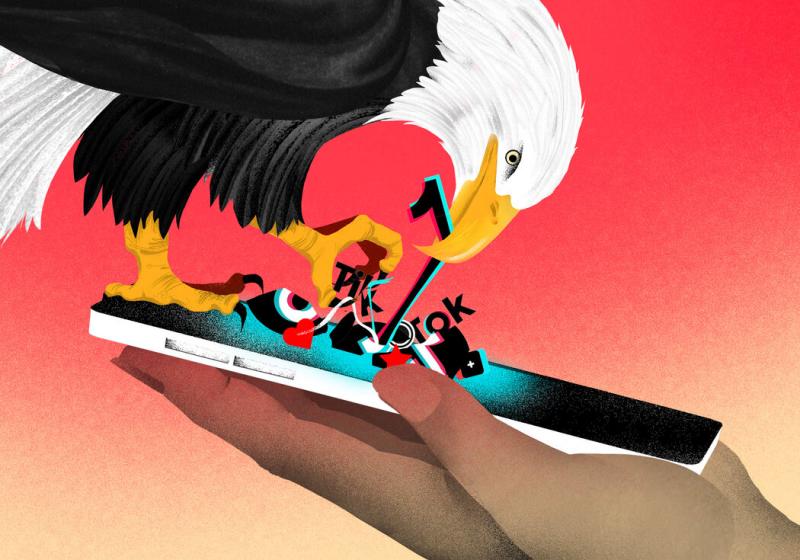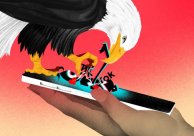
For decades, the United States has shaped itself as defenders who are open to the Internet. They believe that the network should be basically not regulated. Data should not be hindered by national borders and flow around the world.The government opposes foreign Internet review systems and even provides funds for some software, allowing people in autocracy to bypass network content restrictions.
Now, this reputation may be hit.
It is expected that the House of Representatives will try to promote legislation again, forcing Tiktok's Chinese owner to sell Tiktok, or for the first time in the United States to implement a ban on the application. This time, it will also include a assistance plan for Israel and Ukraine.It is expected that this measure will be similar to an independent measure passed by the support of the two parties last month. This is the most important step for Congress to so far in the use of foreign -funded applications such as TIKTOK.
Digital rights organizations and other organizations around the world have noticed this and raised a question: what contradictions are there in TIKTOK's measures with the United States to support the open Internet.
Russian opposition blog author Alexander Gorbnov posted on social media last month that Russia may use this to close YouTube and other services.Global digital rights advocates are worried that the United States will provide excuses for those authoritativeists who want to review the Internet, causing a chain response.
In March of this year, China, which controlled the Internet, cited Tiktok legislation, saying that the United States "said one set and one set".
Tiktok is a social media platform with 170 million U.S. users. Many users share dance actions, publishing political views and sales products.Digital rights advocates said that the United States pointed the spearhead to TIKTOK to destroy its decades of efforts, that is, to promote the open and free Internet managed by international organizations rather than individual countries.
"This will weaken the United States' position in promoting the freedom of the Internet," said Huan Carlos Lara, the director of the Latin American digital copyright organization in Chile."This will definitely not enhance the ability of the United States to promote freedom, security, stability, and interoperable the Internet."
The vision of the United States on the open Internet dates back to the 1990s, when President Clinton said that the Internet should be a "global free trading zone".The previous governments, including the Biden government, have reached an agreement to maintain data flow between the United States and Europe.The US State Department condemned the review system, including Nigeria and Pakistan's restrictions on Twitter (now known as X).
Now, because Tiktok may send data to China or become a propaganda channel for China, the legislative requirements passed by the House of Representatives last month will sell Tiktok to a buyer who satisfies the US government within six months.If the company cannot find a buyer, the application store must stop providing the download service of the application, and the network custody company cannot host Tiktok.(Specific measures that may appear with the aid plan will include the final period or other aspects of the bill, which is not yet known.)
The House of Representatives passed the bill in March and is currently being reviewed by the Senate, which has triggered global anxiety.
Gorbinov, who is Stalin_Gulag (Stalin_Gurag), wrote on the social media service Telegram in March this year that Tiktok's ban may lead to a further review system for Russia.
"I don't think such an obvious thing needs to be said loudly, that is, when Russia blocked YouTube, they would use the US decision to defend themselves," Gorbnov said.
The founder and lawyer of the Software Liberty Law Center in New Delhi Mihicho Jodori said that the Indian government will also use the US ban to defend further combat operations.She said that the Indian government has begun to close the Internet and prohibit Tiktok from the border conflict with China in 2020.
She said in an interview: "This gives them full reasons full of confidence in their past actions, and also give them the courage to take similar actions in the future."
Lara, a digital rights organization, pointed out that countries such as Venezuela and Nicaragua have passed the law to give the government more control over network content.He said that strengthening the government's control over the Internet is a "seductive idea". "If you see such things like this in the United States, it is really possible."
Digital copyright experts said that forcibly the sale or banning Tiktok will make it more difficult for the US government to ask other countries to accept an Internet managed by international organizations.
Other countries have also followed this practice.Russian blockade network content.India and Türkiye take measures to allow them to ask social media to delete posts.
Patrick Timmy, deputy director of the National Security Project of the United States Citizenship Freedom Alliance, said that if measures for TIKTOK become a law, "hypocrisy will be inevitable and will bring huge benefits to China."One of the most famous groups of Tiktok legislation.
Peter Harrell, who had served as the Senior Supervisor of the National Security Council in the Bayeng Government as a senior director of the National Security Council, said that the United States required officials to explain any ban or sale of TIKTOK. This measure restricts digital data with other countries.What are the differences between flowing in its territory.The United States has always advocated that data should be flowing between countries.
"I support Tiktok to take action, but we will have to work hard on the diplomatic front," Harrell said.
Nevertheless, other supporters of the bill refused to accept the action against TIKTOK to destroy the US Internet policy.
A Assistant of the House of Representatives US and the Communist Party of China Strategic Competition Special Committee said that this measure would reduce the risk of China's influence on TIKTOK. Therefore, it is beneficial to the freedom of the Internet. The assistant has not been authorized to discuss the legislation publicly.
A spokesman for the National Security Council stated in a statement that the United States "is still committed to the open Internet."
"This commitment is not contradictory to prevent some opponents from threatening the personal information of Americans and manipulate Americans, thereby maintaining the responsibility of national security," the spokesman also said.



